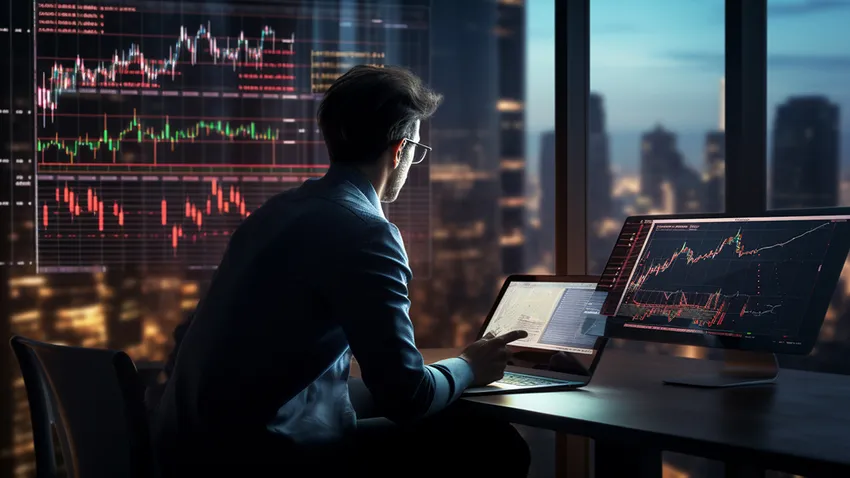What is Algo Trading? The New Wave in Finance That's Catching Everyone's Eye
Algo trading uses computer programs to trade stocks automatically, offering speed, accuracy, and 24/7 operation. But it also comes with risks like technical glitches and potential regulatory changes.

The term "algo trading" has been the new hot thing within financial circles. During the last couple of years, everybody is trying to figure out exactly what algo trading is. It's grabbing attention from experienced investors and curious newcomers alike. But what is algo trading, and why all the fuss? Let's delve into this exciting world of computer-driven finance and explore why its popularity is growing by leaps and bounds.
What is Algo Trading?
Algorithmic trading, otherwise known as 'algo trading', is a means of conducting financial trades using computer programs and complex math formulas. The programs take over with a series of set rules on when to buy and sell on the basis of price, timing, and quantity.
Think about algo trading as having an emotion-free, tireless robot trader working for you all day, every day. There is no possibility that this robot is ever going to get tired of looking at market data and finding trends. It will act on them quicker than any human would be able to do.
The Story of Algo Trading
Though algo trading sounds like a very new phenomenon, the truth is that using technology to get an advantage in trading is centuries old. Indeed, it goes back to the 17th century!
In reality, algo trading came into the picture in the late 20th century, right when computers made their way into the stock market. The New York Stock Exchange launched a system in 1976, called the Designated Order Turnaround, or DOT, which really kick-started computer-driven trading.
The trading algorithms evolved with improvements in technology. Early 2000s, electronic trading had become the norm. In 2009, more than 60 percent of all trades in USA were done by computers. Today we have even reached "nano trading" where trades take place in billionths of a second!
Why is Algo Trading Getting So Much Attention?
1. Trading Without Emotions
One of the biggest plusses of algo trading is taking emotions out of the picture. Human traders often let their feelings—fear or greed, among others affect their decisions. On the other hand, algorithms follow their rules, no matter what the mood in the market is.
2. Lightning Fast Action
Speed can indeed be a major difference in finance. An algorithm trading system can run through, analyze market data in a matter of tiny fractions of a second. It can execute trades accordingly. At this speed, the traders can leverage numerous opportunities that a human might have missed simply.
3. Fewer Mistakes
Mistakes in trading can be very dear in cost. Algo trading reduces these mistakes since it operates in predefined rules. One cannot type the wrong number nor can it make a wrong decision on account of lack of concentration.
4. Always at Work
While the human trader is sleeping and taking rest, algo trading systems can keep watching the markets for 24 hours a day, 7 days a week. In such a system, consistency is maintained for any form of opportunities anytime in the markets.
5. Testing Before Risking Real Money
It helps algo-traders test their ideas against past market data to see how they work before putting a real money risk into the market. "Backtesting" is a process for refining trading strategies and detecting any possible problems that could arise before actually applying them.
Challenges of Algo Trading
There are many technical challenges despite the great many advantages that algo trading offers. These technical problems are:
Like any technology-driven system, algo trading is prone to technical glitches. A defect in the software or even a system crash can result in large losses.
1. Over-Fitting
One of the risks is ending up with algorithms fitting perfectly in back data but fails in front of real and current market conditions. This is referred to as "over-optimization" or "over-fitting."
2. Lack of Human Insight
While algorithms are good at adhering to rules, they lack the intuition and flexibility of human traders. Unpredicted events within the market, or in the economy, may require the level of adaptability that algorithms can't handle.
3. Changing Rules and Regulations
As algo trading becomes more prevalent, regulators try to work out a way to ensure markets stay fair and the potential for abuses is avoided. These changing rules challenge algo traders.
Is Algo Trading Right for You?
Though algo trading offers exciting possibilities, this does not mean it is for everyone. So here are a few things to consider:
1. Technical Know-How: To succeed in algo trading, you must know finance and programming. If you are scared of coding, you will either need to find a developer or use ready-made trading platforms.
2. Money Requirements: While you can do algo trading on a small scale, most strategies require a lot of money to function.
3. Time Investment: Even though algo trading is automated, the systems require constant watching and adjustments. Be prepared to spend time in strategy development, testing, and fine-tuning.
4. Risk Tolerance: Every form of trading, including algo, involves risk. Be sure that you are comfortable with the potential loss of money.
Future of Algo Trading
With rapidly evolving technology, algo trading is becoming ever more sophisticated. Machine learning and artificial intelligence have been implemented in trading algorithms. Such developments hold potential for increasingly smart and adaptive trading systems.
This greater momentum in algo trading could also attract more regulatory scrutiny and efforts to ensure that markets are kept fair.
Conclusion
Algo trading is the exciting mix of the worlds of finance and technology. Fast, tireless, and emotionally unbiased execution of trades sets a new character into financial markets. But for safety and regulatory purposes, it is important to understand the potential and the risks.
Whether algo trading is a revolution in finance or just another tool for traders is yet to be decided. The one obvious thing, however, is that it has changed the character of financial markets and is going to grow in future.
As in any other investment strategy, you need to do your homework and perhaps some consultation with the experts before jumping into algo trading. The future of finance may be algorithmic, but the decision to join should be human.
Does Algo Trading sound interesting to you? Wanna Explore More?
Stratzy is the Key!
Unleash the power of algo trading with Stratzy. Whether you are new to automated trading or looking to improve your strategies, we have got your back:
- Learn Algo Trading Basics: Master the basics of algorithmic trading;
- Cutting-Edge Trading Algorithms: Explore strategies and the ability to create your own;
- Real-Time Market Analysis: Immediate insights to guide your trading decisions;
- Risk Management Tools: Protect your investments like a pro;
- Personalized Strategy Builder: Build custom algos based on your goals.
Need to Trade Smarter, Not Harder? Download the Stratzy app now and get started with algo trading today!
Disclaimer: The information and recommendations presented in this section, including any attached reports, are sourced from third-party providers through diverse channels. The views and opinions expressed within these materials belong solely to their respective creators. These views and opinions do not necessarily reflect the position of Stratzy Fintech Pvt Ltd. Stratzy explicitly disclaims any guarantees, express or implied, regarding the accuracy and reliability of the provided content. We strongly advise consulting with a licensed financial advisor before making any investment decisions based on this information. Remember, seeking independent financial advice is crucial.
